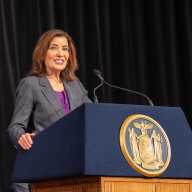UNITED NATIONS, Apr. 18 – The Group of 77 (G77), the largest single coalition of developing countries, has issued a strong letter of protest against a proposal to cut some 155 million dollars from the U.N.’s 2012-2013 biennium budget beginning next January.
The letter, addressed to Secretary-General Ban Ki-moon, stresses the importance of ensuring a budget that reflects the specific needs of each U.N. program – and not the national interests of a minority of member states.
In an implicit reference to the United States and Western nations pushing for cuts, the Group says it wants “to make explicit the voice of 131 member states [including China] calling for a budget based on the actual needs of the Organization, and not in the internal national needs of some members.”
The G77 is also taking the position that the secretary-general has no right to unilaterally amend the budget – or enforce cuts – without consultations with the 192-member General Assembly.
The Group is opposed to any restructuring of the U.N. that is undertaken as a cost-cutting exercise, including the consolidation or integration of departments, regional commissions or offices, or operational activities. The Group argues any such changes need to be undertaken by the member states through the General Assembly.
The proposed cuts include reduction of official travel (in favour of an increase in video conferencing); curtailing or suspending consultancies; cutting down on printed reports (in favour of electronic documents); and an overall reduction in overtime payments.
Additionally, the secretary-general wants to “review” the use of libraries across the organization – perhaps in anticipation of cuts or total elimination of these services. Ban would also like to charge fees for services provided by the secretariat to the various U.N. funds and programs system-wide.
“We must be realistic about the current economic climate,” Ban told senior managers recently. “Even the wealthiest nations are tightening their belts and cutting budgets. The United Nations must be no less disciplined. We cannot go about business as usual.”
But the G77 is refusing to buy that argument.
In a long list of ‘talking points’ sent to its members last month, the G77 said while “the Group understands the backdrop of international and inter-related crises that we are all facing, the use of the financial and economic crisis as a reason to control the growth of the budget of the United Nations is a flawed argument”.
“As we all know, trillions of dollars have been spent in stimulus packages in order to salvage the banking system and the national economies of developed countries,” the G77 said, stressing that the decision to cut the U.N. budget is, therefore, short sighted and perhaps politically motivated.
The Group has decried the announcement “made by the secretary-general through the press” that he would seek a 3.0 percent cut in the next budget for 2012-2013 amounting to about 155 million dollars.
That budget, totaling $5.2 billion, is about 20 percent more than the budget for 2008-2009, which amounted to $4.2 billion.
In its letter to Ban, the G77 says it is of the utmost importance that resources requested in the budget reflect the requirements identified by the program managers, who are directly responsible for the implementation of the mandates approved by the legislative bodies.
While “understanding the backdrop against which the budget is being elaborated and of many voices that call for the Secretary-General to cut the budget,” the G77 says that vision and leadership are necessary to help those who need it the most. “In the present circumstances, developing countries are facing increased difficulties in coping with social and economic challenges.”
“And it would only make sense that the United Nations, as an Organization that contributes to assist the poorest and most vulnerable corners of the world, would receive additional resources,” the letter continues.
Speaking on behalf of the secretary-general, Chief of Staff Vijaya Nambiar told a closed-door meeting of the U.N.’s Administrative and Budgetary Committee last month that Ban has called upon his managers “to do more with less.”
Allaying the fears of the G77, he said: “This is not meant to imply that we may ignore the existing mandates of the General Assembly or to seek to truncate, modify or abridge them in a manner that would alter or modify their essential object.”
“It means rather that we improve the way we do business, that we modernize our operations, identify efficiency gains so that we are able to deliver on our mandates more efficiently and effectively,” he said.
Speaking on condition of anonymity, a G77 member told IPS, while there is some general recognition of the need for greater fiscal prudence in the context of the current economic climate, the G77 on the whole does not like the fact that the secretary-general appears to be “pandering to the West” by taking their side before the budget negotiations had even begun. The negotiations are scheduled for later this year. (IPS/GIN)
























